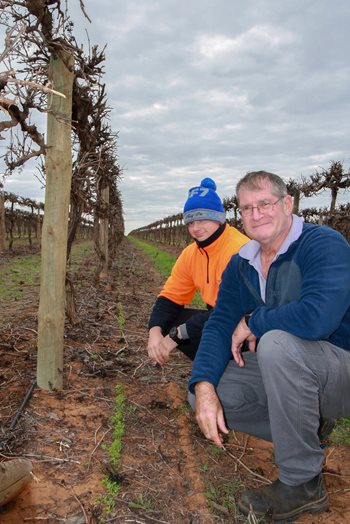THE SuniTAFE SMART Farm has been selected as one of only two sites involved in a three-year cover crop trial.
With support from the Australian Wine Research Institute and Murray Valley Winegrowers, two vineyard properties have provided demonstration sites for cover cropping – Chris Dent (Swan Hill) and the SuniTAFE SMART Farm (Cardross). Both sites have been sown to a mix of species including annual medics, Lucerne, cocksfoot and prostrate saltbush.
The sites in this trial will enable growers to visually assess the mid-row and under-vine cover crops impact on the soil health, weed control, cultural practices on vine health.
Soil, water and vine health data will be collected to help explain the outcomes of the demonstration sites.
The data will show the effectiveness of this strategy towards cover crop growing in typical wine grape plantings that will support growers in adopting cover crop growing practices in their own vineyards.
SMART Farm Project Lead-Hort Innovation/Technology Nicole Byrnes described the site at the SMART Farm that was sown on May 24, 2022.
“Within a 1.5ha drip irrigated Shiraz block and emergence of the annual medics and perennial cocksfoot appears good, in response to the rain which arrived after seeding,” she said.
“The saltbush and lucerne may require a good spring rain and warmer soil temperatures to stimulate germination. A control sward has been imposed to the site. It is envisaged that the medic and annual species will provide a mulch over the summer or are summer dominant growing varieties and growth will be managed over the summer months.”
SuniTAFE Primary Industries teacher Paul McClure said the trial would provide horticulture students with invaluable knowledge on vineyard soil and plant health that they will be able to use throughout their Horticultural careers.
“Trials are all about learning and for our students this will be a great way to learn that the ground doesn’t always have to be bare and worked, to be healthy” he said.
“The trial is particularly beneficial for students studying vineyard sustainability and soil health.
“These types of demonstrations and trials are what will help students make better informed future decisions when working in the horticulture industry.”
Over the three-year study, it is planned to instrument both sites to enable the collection of data pertaining to soil health (chemical, physical and biological), pest and beneficial insect populations, canopy vigour (normalized difference vegetation index) and water use (moisture probe readings) as well as collecting yield data.
